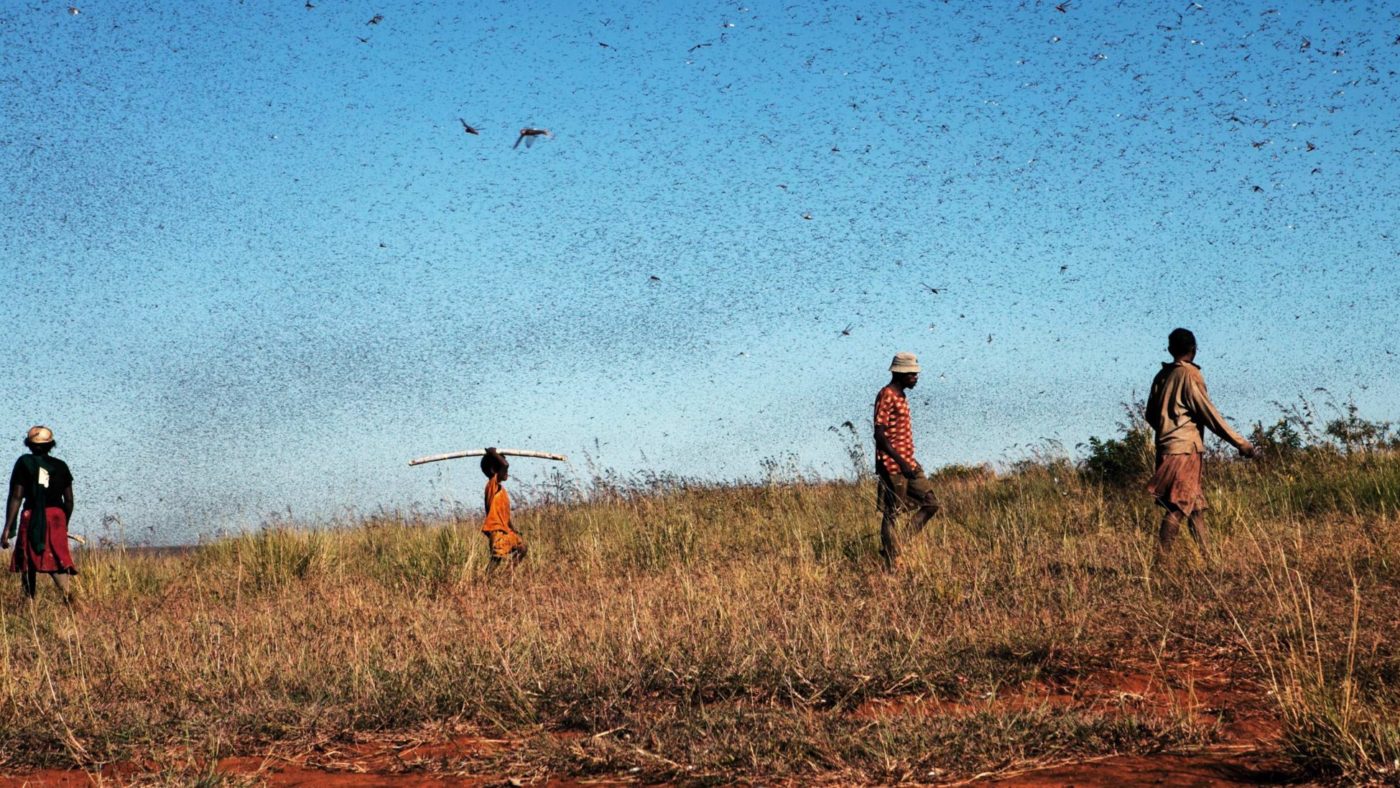Two weeks ago a Boeing 737 on final approach to Dire Dawa, Ethiopia, flew into a massive cloud of locusts swarming above the airport. The insects were sucked into the plane’s engines and splattered across the windshield, blinding the pilots to the runway ahead. Throttling up to climb above the swarm, the pilot had to depressurize the cabin so he could reach around from the side window and clear the windshield by hand. Diverting to Addis Ababa, the plane was able to land safely.
The locusts that almost brought down the 737 are part of the worst infestation to hit Africa in 75 years. Swarms of locusts can blanket 460 miles at a time and consume more than 400 million pounds of vegetation a day; and the grasshopper-like insects increase logarithmically, meaning locust swarms could be 500 times bigger in six months.
The UN’s Food and Agriculture Organization (FAO) calls the threat “unprecedented,” but attempts at aerial spraying have been too little, too late — largely because of FAO’s own politically-driven agenda to limit pesticides — and experts fear Africa may once again be tilting toward widespread famine.
As poor farmers futilely shoo the voracious insects away with sticks, this modern plague highlights the urgent need for pesticides to protect crops and save lives. It also casts into stark relief the tragic consequences of UN, European and environmentalist campaigns to deny these life-saving chemicals to developing nations.
Over the last decade, development organizations and activist NGOs have increasingly pushed organic-style agriculture on the poorest nations, making assistance dependent on a highly politicized version of “agro-ecology” that arbitrarily limits pesticides, bans advanced hybrid crops and genetically modified organisms (GMOs), and extols the virtues of “peasant” farming. The result is that Africa has been left virtually defenseless against successive natural assaults to the continent’s ability to feed itself.
The locusts arrive on top of Africa’s on-going struggle with the Fall Army Worm (FAW), which has already spread to some 44 countries. It feeds on a range of plants, but prefers corn, the staple food for most Africans, and has reduced yields by 50% in many regions.
In the Americas, FAW is kept in check by a combination of insect-resistant GMOs and modern pesticides. Yet most African countries have not authorized GMOs because of well-funded environmental propaganda campaigns demonising the technology — claiming GMOs cause everything from impotence to cancer and autism — and fear of losing their primary export market in Europe, which has arbitrarily restricted critical pesticides used in every other advanced, developed region of the world. The FAO, while discouraging pesticides and GMOs, advises farmers to pick off the insects one by one and crush them with their hands.
Add to this epidemics of Wheat Rust (potential crop loss 100%); Banana Wilt (50% crop loss); and Cassava Mosaic Virus (up to 90% loss). There are thousands of pests around the world that attack agricultural plants, and they don’t just kill crops. Moulds that can only be controlled with pesticides produce highly poisonous metabolites called mycotoxins that, if they don’t kill you immediately, can give you cancer and destroy your immune system. They probably constitute the number one food health threat even in wealthy nations, but we keep levels safe with pesticides, GMOs, and expensive food inspection regimes — all things Africa is being denied or can’t afford.
Then there are the insect-borne diseases like Malaria, Zika, Dengue, and countless other parasitic and viral infections. When Zika or West Nile threaten our cities, we haul out the spray cans and ignore the griping of environmentalists. In Africa, however, the anti-pesticide groups hold sway. At their urging, Kenya may soon ban over 200 pesticides that evidence-based regulatory agencies around the world have deemed safe and that Kenya’s farmers desperately need.
Those who think small-scale organic farming is friendlier to mother nature are wrong. Organic farmers use lots of pesticides. They’re simply “natural” ones, like copper sulfate or neem oil, which are highly toxic to people and wildlife. They’re also less effective against pests, so they have to use more of them. Modern pesticides are among the most carefully tested and regulated chemicals in use, and they are used increasingly in targeted, precise ways to limit wider environmental impacts.
Most importantly, modern farming allows us to produce more food on less land. According to Rockefeller University’s Jesse Ausubel, US corn production has quintupled on the same amount of land. He estimates that if American farming techniques were to be adopted globally, an area the size of India could be returned to nature over the next 50 years.
“Better Living Through Chemistry” was the catchy DuPont slogan of the 1960s. The slogan rings true for those of us living longer, healthier lives of plenty, with more food than at any time in human history. But if the campaigns against chemicals and the demonisation of modern agriculture are successful, these gains may well be reversed.
Perhaps that’s the plan. Radical environmentalists have maintained that human beings are the problem. “Fewer Living Without Chemistry” might as well be the slogan of the modern environmentalist movement.
Click here to subscribe to our daily briefing – the best pieces from CapX and across the web.
CapX depends on the generosity of its readers. If you value what we do, please consider making a donation.


